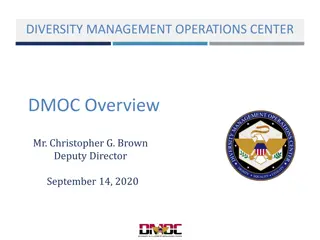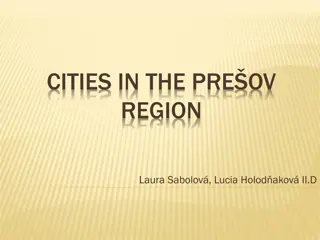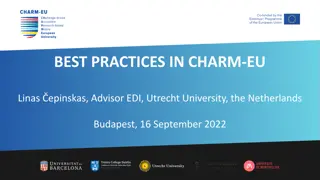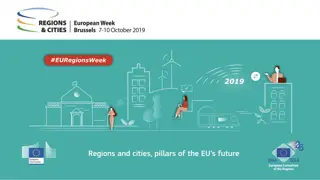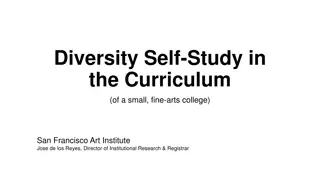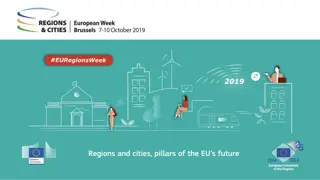Diversity Management in European Towns - Where Do We Stand?
Local authorities play a vital role in upholding human rights and fostering participatory democracy in European towns. The INDIMAE Network aims to promote innovative diversity management strategies for inclusive local governance, aligning with international human rights standards and the EU Charter of Fundamental Rights. This initiative seeks to empower communities, prioritize individual rights, and challenge municipalities to fulfill their responsibilities.
Download Presentation

Please find below an Image/Link to download the presentation.
The content on the website is provided AS IS for your information and personal use only. It may not be sold, licensed, or shared on other websites without obtaining consent from the author.If you encounter any issues during the download, it is possible that the publisher has removed the file from their server.
You are allowed to download the files provided on this website for personal or commercial use, subject to the condition that they are used lawfully. All files are the property of their respective owners.
The content on the website is provided AS IS for your information and personal use only. It may not be sold, licensed, or shared on other websites without obtaining consent from the author.
E N D
Presentation Transcript
DIVERSITY MANAGEMENT IN EUROPEAN TOWNS: WHERE DO WE STAND November 29th2023 Bo Maria Daskalova, PhD
PARTICIPATORY RIGHTS AS GUIDING NORMS OF LOCAL GOVERNANCE IN EUROPE DEMOCRACY, INCLUSION AND HUMAN Local authorities are essential to protecting and promoting human rights. They set laws, policies, and programmes that most directly impact people s lives. Human rights duties of local government follow the classical tripartite typology of States' human rights obligations, namely, the duty to RESPECT, the duty to PROTECT and the duty to FULFIL. Fostering participatory democracy and human rights, European local governments need to be working together with citizens and civil society on inclusive strategies for further development and implementation of local policies based on the EU Charter on Fundamental Rights.
DIVERSITY MANAGEMENT, INCLUSION and HUMAN RIGHTS AS GUIDING NORMS OF LOCAL GOVERNANCE: the role of INDIMAE Network One of the main objectives of the INDIMAE Network of Towns is adopt innovative diversity management strategies as a guiding norm of local governance in European towns in light of international human rights standards and based on the EU Charter of fundamental rights. This way the INDIMAE network sought for ways to encourage participatory democracy and social justice for inclusion of all in European town management. Last but not least: promoting a culture of human rights, using human rights as a foundation, focusing on vulnerable groups; putting individual rights at the centre of public policies and empowering local communities to take the lead and challenge the local municipalities in their responsibilities.
Aims of this Debate Looking at how can European towns be supported to adopt innovative diversity management practices in local governance Aiming to promote a culture of human rights in European town management Learning lessons from the EU Charter of Fundamental Rights
The institution is responsible to ensure representation and participation of its citizens and equality and non-discrimination. TOWN as a democratic to guarantee This consequently means that the diversity of the population should be reflected in the composition of city officials for reasons of equality, participation and accessibility of services. town s local In the long run, a value-oriented approach on diversity is essential. The development of a diversity culture should build on the value of all local people.
How can European towns be supported to to adopt innovative diversity management and inclusion strategies in local governance? Local authorities must be made aware that human rights standards and principles impose obligations on all tiers of government, which extend to public management processes and the way governments raise, allocate, and spend public funds, as well as evaluate their use. European local governments must make an informed and explicit commitment to a human rights-based public management system that shall provide a continuous basis for respecting, protecting, and promoting human rights and good local governance. To fulfil their obligations for adequate diversity management and inclusive strategies, local governments need to be better equipped. Since implementing such strategies and standards is much more than setting objectives, appropriate management arrangements must be put in place.
How can European towns grow and develop skills for diversity management and inclusion? - The local governments have to train their representatives - future leadership, local administration and front-line public servants in contact with rights-holders in the appropriate use of inclusive and democratic human rights-based management tools, and inform the civil society, as well as the public on their role and function in human rights- based inclusive governance. - European towns have to provide for inclusive and participatory local governance and respective capacity building in order to leave no one behind, to guarantee meaningful participation of rights-holders, and to duly consider the views and perspectives of the youth.
How can European towns create best environment for innovative diversity management practices at the local level? - European towns must apply a multi-level governance approach and build alliances at local, regional, national, and international levels, foster knowledge-sharing, join existing networks, and seek exchanges with peers, regional, national, and international actors and organisations, as well as with civil society, academia, and actors of the private sector, with a view to base local public administration more strongly on human rights standards and principles. - The European local governments have to develop knowledge, skills and attitudes to be able to integrate a human rights-based approach in the decision-making processes on the raising, allocation, and spending of funds, as well as in the procedures for auditing and evaluating the budgets.
Thank you for your attention!





